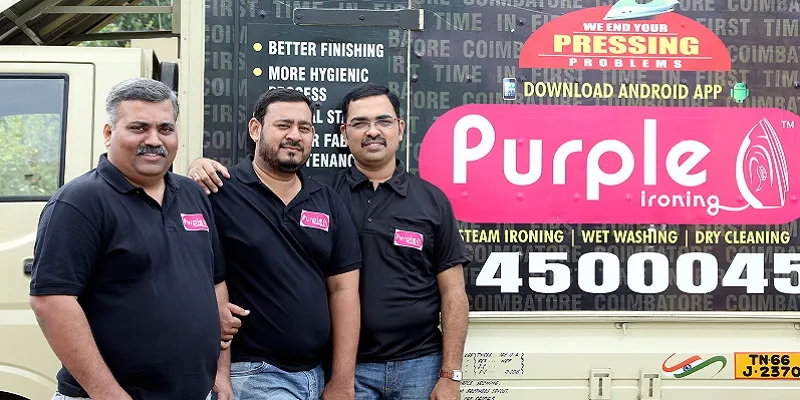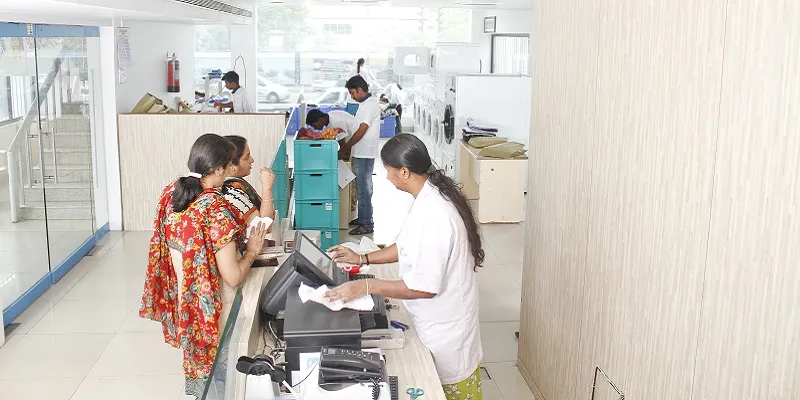Four years into operations and this Coimbatore-based steam ironing startup has acquired a local player and claims to be cash-positive
Nothing quite hits home to find a solution to a problem as facing the problem yourself. For Vijaysarathy, TA Amanulla and CM Vivek, it was seeing their friend wearing mismatched clothes because his dhobi was playing hooky for several weeks.
This was when they got the idea to start Purple Ironing, a steam ironing company with a doorstep service network of over 3,000 households across Coimbatore, Tamil Nadu.
Discovering the bottlenecks
“We are an organised attempt to solve one of the major bottlenecks of the laundry cycle of a typical Indian household,” says 38-year-old Vijay. The trio have over 12 to 18 years of corporate experience. Vijay has worked with the likes of Mahindra Holidays, ITC, Standard Chartered, Reliance and Videocon Telecom. Amanullah has worked at Modi GBC and KArvy Consultants, and Vivek has worked at Luxor, Reliance Comunications, Videocon Telecom and Philips Lighting/Consumer Durables.
Purple Ironing was the first-of-its-kind project in Coimbatore with no processes to refer to or duplicate. Finding manpower who had experience in this was, therefore, a big challenge.

Working along the processes
“Most of the processes like shop floor sequencing, customer call assignment and routing were developed on a basic understanding and have been refined over the years by trial and error method only,” adds Vijay.
Steam ironing is vastly different from the kind of ironing services available in the market today, which are predominantly coal-based or electricity-based. The process uses steam as the primary source of heat to render the fabric wrinkle-free. This ensures least damage to fabric, ensuring longer durability for regularly-used garments.
Recruiting and getting financed
The trio recruited their first ironing staff from export units in Tiruppur, the textile exporting hub of India. The pickup executives were people who would supply newspapers to homes. While initially the team put in their savings to get things moving, after few months, they explored multiple options and their first funding was through a term loan from State Bank of India for machinery and vehicles alone. The term loan funding was limited to machinery and vehicles and they soon had to dig into their own funds to keep funding the working capital gaps for over three years.

Funding and acquisition
In July 2015, Purple Ironing applied for one of the competitions run by TiE. It was assigned to Rajan Srikanth of Keiretsu Forum, Chennai, who become their mentor. He subsequently he got them to pitch at the Keiretsu Forum and they received a seed round last December, which helped them acquire Coimbatore's Washouse.
As part of the service package the team has identified three pain points, namely speed, hygiene and tracking garments and has come up with technology-based solutions to tackle them. Customers can seek doorstep service within two hours, through the app or by calling the helpline, irrespective of of their location in the city. Vijay stresses on hygiene being another important differentiator. The centralised ironing plant processes upto 7,000 garments a day, with great importance given to packaging and transporting them in clean environments. Lastly, customers can also track the status of their service order on the app.
Purple Ironing claims to have made a revenue of Rs 106.89 lakh since its inception in 2012.
Currently fully operational across Coimbatore, it has also launched operations in Tiruppur, under the Washouse brand, and offers customers complete garment-care solutions, from steam ironing to dry cleaning.
“We are cash-positive and plan to raise our next round of funding next quarter in pursuit of expanding our operations and launching in new cities. Our immediate plans are to launch our services in Chennai, followed by Kochi,” says Vijay.
Market
The unorganised laundry market is estimated to be Rs 2.2 lakh crore and this includes housemaids, mom-and-pop stores and dhobis, and the market is currently valued at Rs 5,000 crore. However, this sector has over 7.5 lakh establishments, 98 percent of which are micro-sized and have fewer than 10 workers. Additionally, there are several players like Wassup and Doormint in the space.







